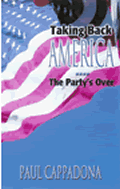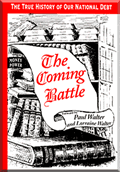Other Guest Articles:
Jury Rights! Jury
Nullification
Constitutional
Tools No
Longer Valid
OIL FOR EUROS, HOW CRUDE

By Andrew Gause
December
5, 2007
NewsWithViews.com
It seems the rush to release dollars has begun in earnest. When our book, �The Secret World of Money,� debuted in 1996, the prediction was made that the new currency emerging from the European community would certainly constitute a threat to dollar supremacy. The Euro was not yet firmly established and many pundits scoffed at the notion. Yet round after round of hurdles were cleared until the Euro became a fact. The Maastricht Treaty passed and the nations of Europe embraced the Euro. Fast forward to 2006. The little currency that could has most definitely evolved into a credible hazard to the dollar.
Many of this nation�s most loyal trading partners are embracing the Euro as a sound alternative to the dollar. While still others sanction it as a way to strike a blow against the American empire. For example, the United Arab Emirates, recently stinging over the decision to force Dubai Ports World out of its United States shipping deal, said they would convert one-tenth of their dollar reserves to the Euro. Even our Middle East pseudo-ally, Saudi Arabia, is considering switching, in sympathy for Dubai, a notable portion of their currency reserves from the U.S. greenback to the Euro. Syria long ago struck its colors from the dollar field having moved 100% of its foreign currency transactions from dollars to Euro.
You may remember President Bush calling on all U.S. banks to end correspondent accounts with Syria due to money-laundering concerns. I think I would count them as against us. While monetary actions are taken for different reasons, these are matters of principal, not economics. Earlier this year the Iranian government made an indignant and very fundamental statement that it had plans to institute an oil bourse in Tehran on March 20, 2006. Iran would begin trading oil to other nations which could only be paid for in Euros.
This is an apparent strike against the U.S., a demonstration of high and mighty ideals. Whatever the reason, many fear that this widespread adoption of Euros might lead to panic selling of dollars on world foreign exchange markets. This would lead to a collapse in the value of our dear old dollar.
Recent posturing by the Bush administration on the subject of Iran and its ability to make �weapons of mass destruction� have caused many observers to suggest that perhaps Iran should be liberated. Others have touted that the oil bourse is the reason for this tough talk. They should relax. The main impetus of a dollar crash would not be a direct result of the Oil for Euro scenario. It would require a bit more than that in the mix. A simple switch to Euros will not do it. There must be an economic reason. That is because, principles aside, there is not much difference between the two currencies. Both are unbacked, or fiat currencies. Both have a wide sphere of influence. Both are the products of stable governments. Economically, however, the dollar has the edge.
Fully 80% of world trade is conducted in dollars. As for the economics, this has all happened before. The last similar threat to the dollar was presented by gold and called the Oil embargo. Richard Nixon had closed the gold window on August 15, 1971. He refused to allow the redemption of U.S. dollars held by foreigners. As a result, oil producing nations refused to accept dollars for oil, preferring the gold that dollars represented. That was what gave dollars their value. By 1974, Henry Kissinger, aided by the specter of the U.S. military, convinced OPEC, the Organization of Petroleum Exporting Countries, to reconsider. Gold, Kissinger argued, was ineffective as a guarantor of wealth.
Merely having it and keeping it are two different things. After all, the status of the dollar as a reserve currency hinged more upon the fact that the U. S. military stood ready with Marines and F-16s to defend the dollar and all who rallied around it. They might just as well take dollars which they could keep, instead of gold which they couldn�t really defend. By making this offer that couldn�t be refused, sweetened with an arms deal to Saudi Arabia, the backing of gold against the dollar lost all relevance. OPEC countries were also assured that they could float their new found tanker loads of dollars through the New York money center banks, recycling them to Brazil and Argentina, thereby setting the stage for the Latin American debt contagion. The Dollar won that round.
From that point on, dollars were in strong demand regardless of how much gold the U.S. held. Whereas prior sentiments meant that as fast as a country acquired dollars they would redeem them for gold or silver dollars, now they could not get enough of these new un-backed dollars. This sudden injection of overwhelming demand for these so called Eurodollars cemented the status of the dollar as the reserve currency for the rest of the world. This demand also created a perfect shield for the New York based controlling members of the Federal Reserve Banks to ramp up the total money supply. Since a fixed quantity commodity like gold or silver is not required, there are no needs for reserves. There cannot be a run on the banks if there is nothing to redeem.
By 1980, the Federal Reserve Banks had doubled the supply of unbacked dollars to nearly one trillion. If the rest of the world wanted dollars in order to buy oil, then the banks would surely create them. U.S. power has been inexorably linked to this situation ever since. Remember, our trading partners store dollars to fund their future needs for oil. In fact, since closing the gold window the total quantities in circulation has reached 11 trillion. Now 2006, the dollar�s supremacy is unchallenged.
The idea of creating a new market in Iran to trade oil for Euro will not represent a change to the domination of the dollar as the world�s reserve currency. At this point it is doubtful that any currency could cause such an economic switch. In order for the Euro to usurp the U.S. dollar, the simple act of selling oil for Euros would not in and of itself be a threat. Only nations who would abandon dollars on principle are leaving now. Those remaining, stay with the dollar because it serves their interests.
The missing link is the economic benefit. The only thing that would have a major impact is the pricing of oil in Euros for less than the cost in dollars. This would create just the financial draw that would create an uproar. We would witness the wholesale selling of dollars by American Oil companies. They would then acquire Euros in order to take advantage of this competitive difference. Those in control surely know how to make a deal. Iran has suddenly decided to postpone its plans to establish an oil bourse in Tehran so maybe all of the saber rattling worked. The WMD problem has also gone away. What a coincidence. This represents a temporary respite at best.
The dollar is no less doomed. Although it is true that this nation has become more productive, we haven�t become eleven times more productive. The only thing that supports that level of monetary inflation is the aforementioned 80% of trade transactions involving the dollar. Without these trade needs, dollars are only good here in the United States. The inflation predicted in previous issues is already starting to manifest itself. With any further lessening of demand for dollars the situation could worsen significantly. The Euro is gaining strength with every small conquest.
|
Subscribe to the NewsWithViews Daily News Alerts! |
The heads of every European country are watching the results of this showdown with great interest. At the end of December 2005, Sven Andersen, director of the Norway oil trading network, suggested that, as a major European oil producer selling its oil into European countries, maybe it should trade its oil in Euros instead of dollars. These aren�t the Iranians! I wonder how long it will be before someone suggests that we liberate Norway.
This article first appeared in The World of Money Newsletter 03/19/2006 A current sample copy can be obtained by calling 1-800-468-2646 Oil For Euros, How Crude
� 2007 - Andrew Gause - All Rights Reserved
Sign Up For Free E-Mail Alerts
E-Mails are used strictly for NWVs alerts, not for sale
Andrew Gause, is a nationally recognized currency historian and money expert, is not afraid to defy the conventional wisdom and back it up with facts. When it comes to the monetary system, social security, the national debt, economic policy or private issues there is no better "go-to" guy.
Andrew has done over 1,000 TV and radio appearances, publishes a newsletter "The World of Money." His first book "The Secret World of Money," challenges a wide range of topics dealing with the history and future of money.
E-Mail: andy@andygause.com
The missing link is the economic benefit. The only thing that would have a major impact is the pricing of oil in Euros for less than the cost in dollars. This would create just the financial draw that would create an uproar.











